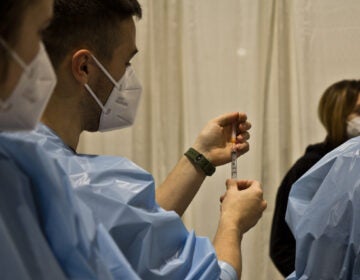Gov. Wolf pushing GOP to move money to help Pa. small businesses
Gov. Tom Wolf is trying to convince GOP leaders to support his scheme to reallocate state funds for business assistance. So far, they’re unmoved.

Jessica Symes, a senior at Kutztown University, works on a pizza order at Mamma's Delight Pizza Restaurant in Kutztown, Pennsylvania. (Matt Smith for Keystone Crossroads)
Ask us about COVID-19: What questions do you have about the current surge?
Gov. Tom Wolf is pressuring the GOP-controlled legislature to reroute money from the Pa. Insurance Department to small businesses that need COVID-19 support.
It’s an idea Wolf has been pursuing since late last year, with little progress. The governor already took a first step, authorizing a transfer of the $145 million from the commonwealth’s Workers’ Compensation Security Fund. But now he needs authorization from the legislature.
“Constitutionally, I can’t act unilaterally on this. I can’t do this myself,” he said Thursday.
Republican leaders haven’t committed to the transfer, and didn’t immediately respond to requests for comment.
Last month, when Wolf first pitched the idea of the $145 million, House GOP spokesperson Jason Gottesman told the Associated Press he thought Wolf’s business closures were primarily to blame for business owners’ struggles, and urged Wolf to ease COVID-19 restrictions.
Wolf’s latest COVID-19 restrictions, which closed indoor dining during a surge in cases, ended on Jan. 4. Right now, in-person businesses are allowed to operate at 75% capacity, and restaurants can open at 50% capacity.
Coronavirus cases have improved somewhat in recent weeks, though cases have remained well above the rates Pennsylvania and other states saw during the summer.
The Insurance Department money in the proposed transfer is funded through premiums on workers’ compensation insurance policies, which ensure claims can be paid if an insurer becomes insolvent.
Lately, it has become a go-to source for lawmakers trying to plug budget holes in a year when several of Pennsylvania’s revenue sources have weakened due to the pandemic.
Wolf and Republican lawmakers already agreed once to tap into it, authorizing $185 million to balance the budget deficit in November.
Wolf acknowledged he’s not thrilled to tap into the fund again. But he says businesses urgently need at least a little bit of help, and another round of CARES Act funding is long-delayed, and isn’t immediately expected to make it to states.
“This is like, plan C or D,” Wolf said.
It’s unclear how far the money would go. Wolf notes it wouldn’t be a huge influx of cash, and might not make a dent for larger businesses that are struggling. But Wolf added he’s hoping it “can go a long way” to help tide over smaller businesses with slightly more compact budgets.
Other Democratic leaders, who joined Wolf’s press conference in support of the fund transfer, backed him up.
“We already have an infrastructure to distribute grants, we just did it a few months ago. So all we need is the authorization,” House Democratic Leader Joanna McClinton said — adding that she’d ideally like business owners to be able to use it for a variety of financial burdens, from payroll to rent.
“It can definitely do so much good for business owners across Pennsylvania,” she said.
The Wolf administration has already pulled the $145 million out of the Insurance Department and has it set aside to be spent. But it can’t go anywhere until the legislature approves a way to hand it out.
Wolf criticized lawmakers for not making business relief a higher priority in their new session, which started this month.
So far, Republicans have focused their efforts on a measure — opposed by Democrats, good-government groups and legal organizations, like the Bar Association — that would amend the constitution to elect judges by district. It’s intended to ensure fewer judges from big cities get elected.
They’re also holding hearings on rolling back a recent election expansion — an effort that members of the caucus have said are largely motivated by pressure from supporters of President Donald Trump and his baseless claims that his 2020 election loss was due to fraud.

Get daily updates from WHYY News!
WHYY is your source for fact-based, in-depth journalism and information. As a nonprofit organization, we rely on financial support from readers like you. Please give today.




![CoronavirusPandemic_1024x512[1]](https://whyy.org/wp-content/uploads/2020/03/CoronavirusPandemic_1024x5121-300x150.jpg)


